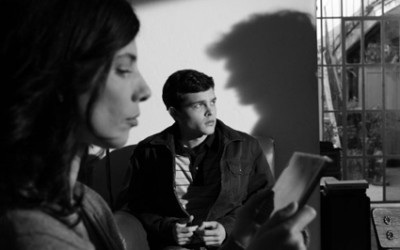
Francis Ford Coppola's Tetro is a beautiful surprise. This film flew under the radar during its initial, limited theatrical run, and was recently released on DVD and Blu-Ray without fanfare. Over a career of extremes, Coppola has created at least four unquestioned masterpieces (all in the 1970s), several entertaining, moderately-successful pictures (mostly in the 1980s), and a handful of flops (mostly in the 1990s). These highs and lows have made Coppola unpredictable from a Hollywood perspective, and had a direct impact on Tetro being a low-budget ($15 million), independently financed production. Coppola has been forced by his excesses to efficiently channel his huge talent and the result is a controlled, polished movie that tells an exciting, moving story. To those who doubt the great man as a bigger-than-life auteur who turns his film projects into enormous resource-drains, Tetro should prove that he retains all of his filmmaking skills after a couple of shaky decades.
17-year-old Bennie Tetrocini (Alden Ehrenreich) tracks down his long lost brother Angelo (Vincent Gallo) in Buenos Aires, but Angelo - now known as "Tetro" - isn't exactly thrilled to see him. For the last decade, Tetro has cut off all contact from his family, starting a new life in Argentina with his common-law wife Miranda (Maribel Verdu). Bennie is dumbfounded, having had only a single letter from Tetro since he left home, one that promised to come back for him someday. Needless to say, that never happened, and Bennie is somewhat bitter. But Tetro has changed; he crankily refuses to explain himself or talk about their shared family with Bennie. When Bennie discovers Tetro's unpublished (and autobiographical) writings, he unlocks their tortured family history. Bennie writes a play based on Tetro's work, which brings their touchy relationship to a head.
Filmed in beautifully modulated black-and-white (with flashbacks and dance sequences in color), Coppola's family story is consistently compelling and marked by a capable set of performances. Coppola's command of atmosphere is just stellar here; working with photographer Mihai Malaimare, Jr., and editor Walter Murch, he creates a noir paradise out of the film's Argentine locations. Delicately-arranged lighting and shadowed exteriors lend a mysterious weight to Tetro's commitment to self-destructive secrecy. The formal polish of the movie also suggests a bygone era of classics like Casablanca and The Third Man - both of which also dealt with characters trying to escape their pasts. Along with direct references to the work of Powell and Pressburger (especially The Tales of Hoffman), Coppola's visual approach is heightened, operatic, and supremely stylish.
As Tetro, Gallo, whose presence is at first odd and off-putting, tries hard to rise to the challenge of his inward, contrary character. Tetro has modeled his new identity as a man of mystery - an obscure, opaque "writer" who hasn't published anything. But he's also in great emotional pain, and at first, we don't exactly understand why. Gallo is good in the role, but not quite as good as he needs to be. Tetro's personality is supposed to be hidden for much of the film, but Gallo is overly emotive, telegraphing the hidden parts a bit too early. (Gallo can't be blamed for this alone, as Coppola should have been able to better manage his actor.)
As Bennie, the younger brother, Alden Ehrenreich delivers a very authentic sense of burgeoning maturity. Like Tetro, Bennie has essentially removed himself from the family. After escaping military school, Bennie has sailed around the world as a steward on a cruise ship. His only familial interest lies with Tetro, who he tries desperately to connect with.
Coppola's original screenplay builds bold characters and places them in an exotic setting conducive to a sense of unpredictability. Intertwined themes of family, betrayal, jealousy, and creativity are familiar, but are given new life through the prisms of these compelling brothers. Interpretive dance sequences that "show" Bennie's vision for his play serve as a unique way of portraying the creative process at work. The outstanding score by Osvaldo Golijov weaves a Tango-inspired soundscape throughout the picture, lending a sensual air to the whole experience.

No comments:
Post a Comment